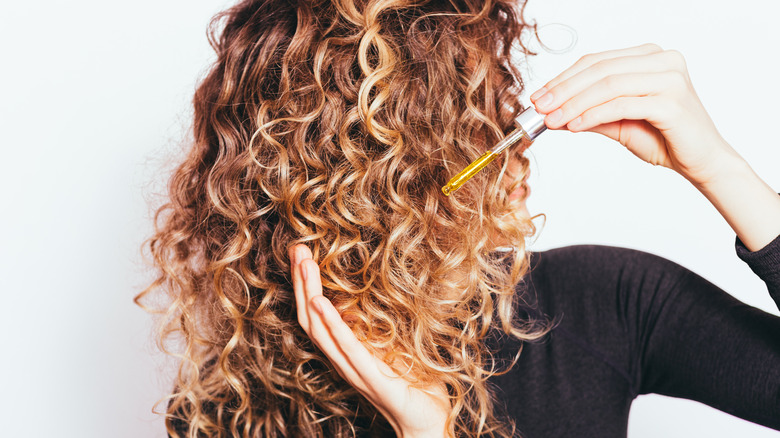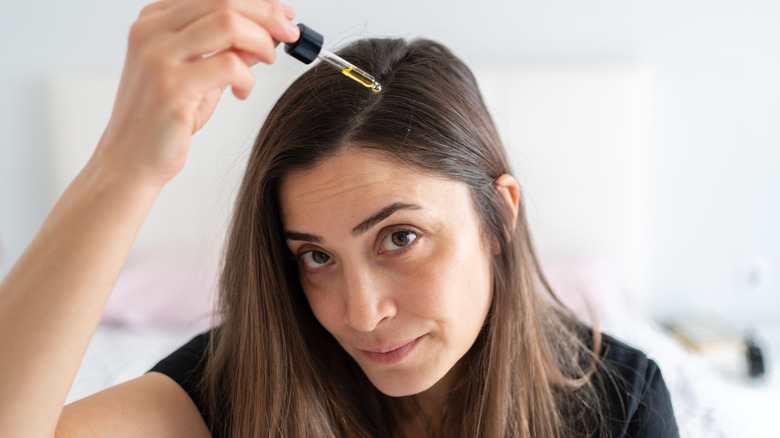The Haircare Benefits Of Almond Oil Explained
While it's known that almond oil can make your skin glow like magic, one thing you may not be aware of is how it can help your hair, too. You've probably walked by a few almond oil hair products in the beauty aisle and wondered if they actually do anything. If you're looking for a way to give your hair some needed moisture and care, this botanical ingredient might be something you'll want to add to your shopping cart.
One of many plant oils used for hair and skin products, almond oil is made by pressing or using heat and chemicals to extract oil from ripe almonds. It's important to note that there are two types: bitter and sweet. For hair and skin care purposes, you'll want to use sweet almond oil. Bitter almond oil is made from a different kind of almond and is typically used for fragrances, not for beauty needs. Sweet almond oil can be used on all hair types, and it's most beneficial for damaged or dry hair.
Almond oil can strengthen and hydrate damaged hair
We put our hair through the wringer sometimes. From daily heat styling to harsh chemical treatments, and even sun exposure, our strands are subject to various stressors. Unfortunately, all of these can ultimately lead to hair damage and breakage. While it's tempting to by a serum made with a ton of synthetics, almond oil might just be the hero you need when it comes to treating some of this damage, especially with split ends, frizz, and breakage. As explained in a 2022 article by the International Journal of Trichology, almond oil has emollient properties, which means it both moisturizes your hair and smooths its texture. Much of this is due to the high content of omega-3 fatty acids in almond oil, including oleic, linoleic, and palmitic acids. In fact, almond oil has a greater number of fatty acids than coconut oil, which makes it even better at moisturizing the hair shaft.
Almond oil is especially beneficial when applied to the ends of your strands to add shine and softness, and it can even be applied to the scalp as well. If you're curious about trying almond oil in your hair, do a patch test in a small area of your hair to see how it reacts. Be careful not to leave large amounts of it on your hair for too long. Hair health expert and trichologist Shab Reslan tells Byrdie, "I don't recommend leaving any kind of oil on the hair for a prolonged period, as it can harden and coat the hair's cuticles." Wear it for a few minutes before you plan to wash your hair.
It can treat scalp issues
Are you sick of dealing with dandruff or an itchy, dry scalp? We totally understand. When applied to the scalp, almond oil can help moisturize dry skin and manage flakiness. Dermatologist Annie Gonzales, MD explains to Byrdie, "Almond oil is also antibacterial, making it a great scalp treatment for those suffering from dandruff caused by excess yeast growth." As you use the oil on a consistent basis, you may notice a positive change in your scalp.
Though more clinical research is needed, almond oil has historically been used in Ancient Chinese and Ayurvedic medicine to treat psoriasis and eczema. The National Eczema Association does recommend trying out almond oil to soothe eczema, though they advise not to use it if you have any allergies or sensitivities to almonds. Speak to your doctor about whether it's safe for you to use. Additionally, avoid using heat tools on your hair after using almond oil, as this can heat up the oil and lead to burns.


